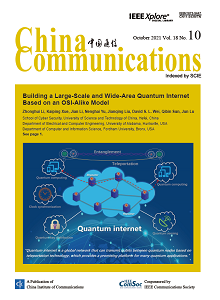基于边缘计算的无线区块链网络资源交易与矿工竞争
IF 3.1
3区 计算机科学
Q2 TELECOMMUNICATIONS
引用次数: 0
摘要
本文章由计算机程序翻译,如有差异,请以英文原文为准。
Resource trading and miner competition in wireless blockchain networks with edge computing
To promote the application of edge computing in wireless blockchain networks, this paper presents a business ecosystem, where edge computing is introduced to assist blockchain users in implementing the mining process. This paper exploits resource trading and miner competition to enable secure and efficient transactions in the presented business ecosystem. The resource trading problem is formulated as a Stackelberg game between miner candidates and edge computing servers, where computing, caching, and communication resources are jointly optimized to maximize the potential profit. Partial offloading is introduced to further enhance the system performance when compared with the existing work. We analyze the existence and uniqueness of the Nash equilibrium and Stackelberg equilibrium. Based on the optimization result, winners are selected from the set of miner candidates by bidding and constitute the mining network. Simulation results demonstrate that the proposal is able to improve the social welfare of blockchain miners, thus stimulating more blockchain users to join the mining network.
求助全文
通过发布文献求助,成功后即可免费获取论文全文。
去求助
来源期刊

China Communications
工程技术-电信学
CiteScore
8.00
自引率
12.20%
发文量
2868
审稿时长
8.6 months
期刊介绍:
China Communications (ISSN 1673-5447) is an English-language monthly journal cosponsored by the China Institute of Communications (CIC) and IEEE Communications Society (IEEE ComSoc). It is aimed at readers in industry, universities, research and development organizations, and government agencies in the field of Information and Communications Technologies (ICTs) worldwide.
The journal's main objective is to promote academic exchange in the ICTs sector and publish high-quality papers to contribute to the global ICTs industry. It provides instant access to the latest articles and papers, presenting leading-edge research achievements, tutorial overviews, and descriptions of significant practical applications of technology.
China Communications has been indexed in SCIE (Science Citation Index-Expanded) since January 2007. Additionally, all articles have been available in the IEEE Xplore digital library since January 2013.
 求助内容:
求助内容: 应助结果提醒方式:
应助结果提醒方式:


